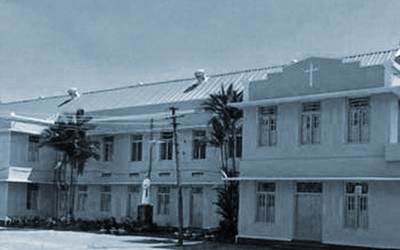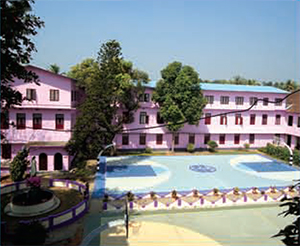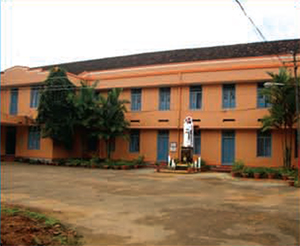LITTLE FLOWER SEMINARY
Little Flower Major Seminary, Aluva is the Major Formation Centre of the Little Flower Congregation (CST Fathers).
Every member of the Little Flower Congregation cherishes the moments they spend in the Little Flower Seminary which is the abode of wisdom. Every nuke and corner of this seminary chuckles in remembrance of the great and the unsung hero, Fr. Basilius Panat CST, the Founder of the Little Flower Congregation.
There will be a lot of dreams and aspirations for a founder when he founds a congregation. All his dreams will be cherished on his deep Christ experience. Establishment of a seminary will be one of them. Because it is through the seminary the future of the congregation is molded. In this respect the establishment of a major seminary is really the necessity of the congregation. At first the major seminary received its image and shape in the dreams of the founder. So the long cherished dreams of Father Founder was named as Little Flower Seminary. The name which is most suitable and appropriate to this seminary was Little Flower, because the seminary of Little Flower Congregation must be named as little flower seminary. For the nature of the seminary is to be totally identified with the congregation. In this regard each seminarian has to be molded in Theresian spirituality through identifying oneself with the name of the seminary. It is a privilege to have a same patroness for the congregation and its major seminary. In this respect the essence of this seminary becomes the very spirit of our patroness and the Charism of the founder.
A Mission In Vision
Little Flower Seminary was the historical need for the congregation. The chief aim visualized by founder in establishing the major seminary of our own. was the religious formation. The seminarians should be formed under the charism and the spirit of the congregation. It is made possible only through establishing our own seminary. So it was the necessity of the time. Community life is accomplished in its fullest sense in the seminary through the mutual interaction and sharing.
The Realization of a Dream
The history of Little Flower Seminary begins with the dream of Father Founder to have a major seminary of our own. He was in distant search of a land to build up his dreams. The land for this purpose was purchased in 1944 from Mr. Xavier Manjooran. Though it was in the heart of the Aluva town, it remained as an uncared place. There was no proper road to this land. Mr. Virankutty and his son Muhammad were the care takers of this land from 1944 to 1959; the construction of the seminary was begun. This was really one of the milestones in the history of the congregation. The next Herculean task was to construct a road to the land where the seminary was to be built.
In this attempt Fr. Basilius had to undergo a lot of trials and tribulations. But all the hurdles were successfully overcome by Father Founder.
He submitted the memorandum for the approval of the municipality in an extra ordinary way. He gave those properties to the municipality for the construction of the road. And the issue was settled during the reign of communist government. Overcoming all the problems, even economic struggle, the construction of the seminary was realized in the year of 1960.
Further Development of LF Seminary
In 1962 philosophy was begun for seminarians. Thenceforth, many events took place in the seminary. Fr. Basilius memorial intercollegiate debate, Fr. Basilius symposium in 2010, etc., were some of them. The seminary became an institute of philosophy and religion. Many students have completed their courses in this seminary. The academic register shows that from 1962 to 2010 around 625 students have passed out from here.
Objective of our seminary is to provide priestly formation to the candidates. The formation given here aims at the development of a fully integrated priestly personality taking into account the human, spiritual, intellectual, pastoral and missionary dimensions of priestly formation.
Little Flower Seminary is the fruit of the toil, blood, sweat and tears of many of our fathers especially of our Father Founder. In this jubilee year we bow before Father Founder and all other priests who worked for the Little Flower Seminary. We gratefully remember all the benefactors and well wishers.

Seminary
It is the expression of the farsighted vision and the fruit of the challenging endeavour of love and action as taught and witnessed by Very Rev. Father Basilius (Thomas) Panat, the venerable Founder of our Congregation. It has a history spanning over five decades. It was established in 1960 as Little Flower Study House and ofcially inaugurated on 12th March, 1961. It was constituted into a Major Seminary to teach Philosophy and Religion on 3rd July 1962. The Seminary is a home for all the Major Seminarians of the Congregation.
As Fr. Basilius’ religious vision formed itself into a Community, he found out a plan and programme of action to train the candidates according to his vision and way of life. The foundations of his programme of formation were his prudent adaptation of the concrete living-context of the people and of his times. His life and vision were influenced not only by his spiritual and religious convictions but also by the Freedom movement of India, Nationalist Movements, Ideologies of Rural Uplift and scientifc thinking. The broad vision and reformist orientation of the II Vatican Council had its immediate impact and influence upon our Founder. His challenging and polyvalent vision, formed out of these divergent spiritual, social and intellectual influences, found its concrete expression in starting a Formation House for the Seminarians of the Congregation. Little Flower Seminary, Institute of Philosophy and Religion, is a tangible expression to the legacy and heritage of its Founder to the new generation..
-
OUR CHARISM
-
OUR MOTTO
-
THE EMBLEM AND ITS SYMBOLISM
The above given title is the formulation of the charism of Little Flower Congregation. Hence, it is central to our spirituality and self-understanding. Jesus is the God of the little ones, of small things. The realities that are intimately related to his life, such as crib, cross, the Kingdom of God, etc., bespeak that Jesus is the God of the little ones. The little ones are all those who are on the periphery. They are the poor, the lowly, the oppressed, the illiterate, the excluded, the last, the least, the lost ones. Jesus was born on the periphery; carried out his mission on his periphery and among those in the periphery and finally died on the periphery. The good news of Jesus is the birth of a new hope in the hearts of millions who live on the periphery; the poor, the captives, the blind, the oppressed (Lk: 4:18). He belonged to a carpenter family, part of the lower middle class. Until he was thirty years old he worked as a rural youth in the carpenter’s workshop and earned his livelihood. He got involved in all the daily affairs of his village. His life and ministry were for the most part in Palestine. He spent most of his time in Galilee. most of his activities were centered in Caphernam, activities that were limited to ten kilometer’s diameter. He does not go to the city centers at all. We see no important city mentioned in the gospels. Instead we come across the rural places such as Nazareth, Bethsaida, Caphernam. The sphere of Jesus was the world of the small peasants, dispossessed of their good lands by Roman colonization and pushed to the rocky soil on hillsides. It was a world of the poor, the excluded and the unemployed. Jesus is the God of the little ones. He was born in a stable amidst poverty, privation and discomfort. He identified himself with the lowly in his ministry and finally died on the cross as wholly poor and outcast.
Now let us see the persons whom he elected and called. Four of them were fishermen, one was a tax collector; another one was a zealous of member of an outlawed group. Thus his disciples were poor and humble. Further we see that the language of Jesus was the language of the little ones. His parables refer to the humble realities of daily life of ordinary man; sowing and fishing, cooking and stitching, salt and leaven, sheep and goats, fig trees and vineyards. They reflect the life of the daily wage earners, of poor women and children. His parables came from the sphere of the ordinary people. They have come up from the life contact of the farmers and ordinary people in Galilee. He is the Messiah of the poor, one who perceives the advent of God in the simple and humble lives of the insignificant ones.
The charism of the Little Flower Congregation is, ‘be little, serve the little’. We have to search out the meaning of this word little first of all from the Bible, from the life and ministry of Jesus, from the life and teaching of Little Flower, from the God experience of our founder and from the interpretation of the contemporary socio-religious and cultural reality. Today more than ever the Church is called to follow Jesus by being present among this insignificant people, God’s little ones. Today the corporate greed has pushed in its agenda. They are left out, ignored and simply forgotten. The language of the market and the media is not the language of the poor and little ones.
Little Flower wanted to associate herself with everything that is little, that is why she called herself Little Flower, little bird, little queen, little soul, etc. There is invitation in the bible to become a child. In bible child is the symbol of the little ones and the marginalized. According to the Gospel a perfect disciple is a perfect child. For her these little ones were Franzini for whose conversion she prayed, Sr. St. Peter the aged and sick sister of her community, the sisters who were neglected by others in her convent, her missionary brethren and sinners all over the world. She loved them all, prayed for them all, she took up all her sufferings for them; she saw the whole world in and through them. When we say that our apostolate and ministry are in the rural domain, its basis is the gospel, the life and example of Jesus. It is there that we meet the little ones. Our founder saw the little ones in the orphans, in the poor villages of Mookkannur in the disorganized and illiterate farmers in the villages of Kerala. When we say that the charism of the Little Flower Congregation is related to villages and villagers, we are putting it concretely. It is the same as to saying that our charism is to be little and serve the little, it is above all a call to be little by personal, transformation, and then to take the side of the poor, lowly and little ones in the world and society, thus the words little and littleness are central to our self- understanding.
Read More
 The Institute envisages an integral formation of the Seminarians to become the models of Christ who is teacher, priest and pastor (OT 4). The philosophical training is meant to help the students acquire, through various academic engagements and disciplinary activities, the ability to reflect over matters of intimate human concern with certitude and also to help them move towards the goal of attaining a discursive and intuitive apperception of Reality in its coherent dimensions of Man, Nature and the Ultimate.
The Institute envisages an integral formation of the Seminarians to become the models of Christ who is teacher, priest and pastor (OT 4). The philosophical training is meant to help the students acquire, through various academic engagements and disciplinary activities, the ability to reflect over matters of intimate human concern with certitude and also to help them move towards the goal of attaining a discursive and intuitive apperception of Reality in its coherent dimensions of Man, Nature and the Ultimate.
As such the entire philosophical programme of this institute is oriented towards the intellectual and experiential realization of this holistic vision of Reality. Transcending a deceptively contradictory world and worldview is necessarily accompanied by a substantively unitary awareness of the eternal truth, which is essentially harmony. The course of philosophy  extending over a period of three years and envisaged to be an intensive, collective and personal search for knowledge bears its fruits as the partakers of this common journey genuinely commit themselves to the enhanced goodness of every human and the increased welfare of every creature, every plant, every ray of light and every particle of soil in this cosmos and feel the ecstatic joy over the same.
extending over a period of three years and envisaged to be an intensive, collective and personal search for knowledge bears its fruits as the partakers of this common journey genuinely commit themselves to the enhanced goodness of every human and the increased welfare of every creature, every plant, every ray of light and every particle of soil in this cosmos and feel the ecstatic joy over the same.
 The period of Major Seminary Formation is a period of the personal integration and consolidation of all the various dimensions and aspects of formation that go into the making of a CST Priest. Required degree of human development in its affective and other aspects, friendships, a positive attitude to the interior solitude, active and critical involvement in the issues and problems of one’s context and a constructive and prophetic response to them, deepening the social and religious charisma of the congregation are qualities indispensable to our major seminarians.
The period of Major Seminary Formation is a period of the personal integration and consolidation of all the various dimensions and aspects of formation that go into the making of a CST Priest. Required degree of human development in its affective and other aspects, friendships, a positive attitude to the interior solitude, active and critical involvement in the issues and problems of one’s context and a constructive and prophetic response to them, deepening the social and religious charisma of the congregation are qualities indispensable to our major seminarians.
 Little Flower Seminary is also the common house of formation for the major seminarians of Little Flower Congregation. Normally, all our major seminarians do their philosophical studies in this Institute. This is to enhance the spirit of unity and mutual acquaintance and friendship among the members of the Congregation by means of living together, sharing and interaction. Thus this seminary stands out as an icon of unity and center of integration and co-ordination among the members of our Congregation.
Little Flower Seminary is also the common house of formation for the major seminarians of Little Flower Congregation. Normally, all our major seminarians do their philosophical studies in this Institute. This is to enhance the spirit of unity and mutual acquaintance and friendship among the members of the Congregation by means of living together, sharing and interaction. Thus this seminary stands out as an icon of unity and center of integration and co-ordination among the members of our Congregation.
Read More
The central symmetric image at the crest of the emblem is an allusion to the ancient Chinese symbol called tai- chi ‘T’ u or ‘Diagram of the supreme Ultimate’. The diagram is a symmetric organization of the dark yin and the bright yang -the two polar opposite forces are perfectly balanced here, each having the germ of its opposite. While the rotational nature of the symmetry suggests the dynamic aspect of reality, the blended harmony of the yin and the yang represents the supra conscious awareness that all differences and dichotomies are only apparent and relative within all embracing unity. The thrust of the academic training in this institute is as Krishna says in Gita, to “be in truth eternal, beyond the earthly opposites.”
Form a revelatory point of view, the Holy Cross is the symbol of unification and reconciliation. The cross having reconciled the polar opposite s of life and death, of good and evil, sends out the liberative energy to the emancipations of the entire reality. The background of the cross represents itself as the ultimate abode of the fusion for every multifaceted horizon of reality.
The hermeneutical tool towards the attainment of this goal is the reflective and critical sravana and manana of the spoken and written word and the insightful observation and meditation to the book of nature the two sources of revelation in Augustinian terms. This is attempted to represent in the intersecting of the books of scripture and the book of nature at the bottom of the emblem.The praxis of this intuitive and intellectual awakening is acompelling commitment to the service of the entire creation. Hence the motto of our institute: sarva bhuta hite ratah- those who delight in the welfare of all beings, the text of our motto is from Bhagavad Gita (5:25; 12:4). Here the dharma of the human is paraphrased as delight in the welfare of all beings. The Gita expects the perfect human to delight in, to go in ecstasy over the welfare of all beings.
Read More


 The Institute envisages an integral formation of the Seminarians to become the models of Christ who is teacher, priest and pastor (OT 4). The philosophical training is meant to help the students acquire, through various academic engagements and disciplinary activities, the ability to reflect over matters of intimate human concern with certitude and also to help them move towards the goal of attaining a discursive and intuitive apperception of Reality in its coherent dimensions of Man, Nature and the Ultimate.
The Institute envisages an integral formation of the Seminarians to become the models of Christ who is teacher, priest and pastor (OT 4). The philosophical training is meant to help the students acquire, through various academic engagements and disciplinary activities, the ability to reflect over matters of intimate human concern with certitude and also to help them move towards the goal of attaining a discursive and intuitive apperception of Reality in its coherent dimensions of Man, Nature and the Ultimate. extending over a period of three years and envisaged to be an intensive, collective and personal search for knowledge bears its fruits as the partakers of this common journey genuinely commit themselves to the enhanced goodness of every human and the increased welfare of every creature, every plant, every ray of light and every particle of soil in this cosmos and feel the ecstatic joy over the same.
extending over a period of three years and envisaged to be an intensive, collective and personal search for knowledge bears its fruits as the partakers of this common journey genuinely commit themselves to the enhanced goodness of every human and the increased welfare of every creature, every plant, every ray of light and every particle of soil in this cosmos and feel the ecstatic joy over the same. The period of Major Seminary Formation is a period of the personal integration and consolidation of all the various dimensions and aspects of formation that go into the making of a CST Priest. Required degree of human development in its affective and other aspects, friendships, a positive attitude to the interior solitude, active and critical involvement in the issues and problems of one’s context and a constructive and prophetic response to them, deepening the social and religious charisma of the congregation are qualities indispensable to our major seminarians.
The period of Major Seminary Formation is a period of the personal integration and consolidation of all the various dimensions and aspects of formation that go into the making of a CST Priest. Required degree of human development in its affective and other aspects, friendships, a positive attitude to the interior solitude, active and critical involvement in the issues and problems of one’s context and a constructive and prophetic response to them, deepening the social and religious charisma of the congregation are qualities indispensable to our major seminarians. Little Flower Seminary is also the common house of formation for the major seminarians of Little Flower Congregation. Normally, all our major seminarians do their philosophical studies in this Institute. This is to enhance the spirit of unity and mutual acquaintance and friendship among the members of the Congregation by means of living together, sharing and interaction. Thus this seminary stands out as an icon of unity and center of integration and co-ordination among the members of our Congregation.
Little Flower Seminary is also the common house of formation for the major seminarians of Little Flower Congregation. Normally, all our major seminarians do their philosophical studies in this Institute. This is to enhance the spirit of unity and mutual acquaintance and friendship among the members of the Congregation by means of living together, sharing and interaction. Thus this seminary stands out as an icon of unity and center of integration and co-ordination among the members of our Congregation.
